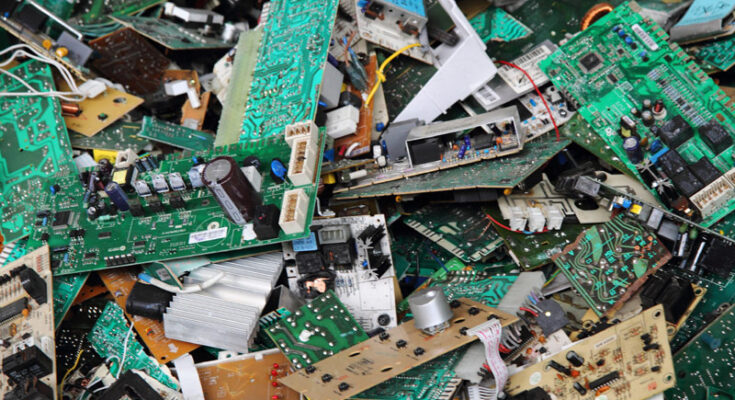WEEE stands for Waste Electrical and Electronic Equipment (WEEE) recycling has become an increasingly important topic as our society becomes more reliant on electronic devices. With the rapid advancement of technology, the disposal of electronic waste has become a significant environmental concern. This article will delve into the significance of WEEE recycling and its role in shaping a sustainable future. Find out more about the crucial aspects of WEEE recycling and how it contributes to a greener tomorrow.
The Environmental Impact of WEEE
The improper disposal of electronic waste poses a grave threat to our environment. Electronic devices contain hazardous materials such as lead, mercury, and cadmium, which can contaminate soil and water sources if not handled properly. Furthermore, the energy-intensive production and extraction processes involved in manufacturing electronic devices contribute to greenhouse gas emissions and the depletion of natural resources.
The Importance of WEEE Recycling for a Sustainable Future
WEEE recycling plays a crucial role in mitigating the environmental impact of electronic waste. By recycling electronic devices, valuable materials such as gold, silver, and copper can be recovered and reused, reducing the need for mining and the associated environmental damage. Additionally, proper recycling ensures that hazardous substances are safely disposed of, preventing them from leaching into the environment.
The WEEE Recycling Process
The WEEE recycling process involves several stages to ensure the effective and safe recycling of electronic waste. First, the waste is collected and sorted based on its category and type. Then, the devices undergo a dismantling process where components and materials are separated for further processing. This is followed by the extraction of valuable materials through techniques such as shredding, sieving, and magnetic separation. Finally, the recovered materials are purified and prepared for reuse in new products.
Benefits of WEEE Recycling
WEEE recycling offers numerous benefits that contribute to a sustainable future. Firstly, it conserves natural resources by reducing the need for raw material extraction. This not only helps preserve our planet’s resources but also reduces energy consumption and carbon emissions associated with mining and manufacturing processes. Secondly, recycling electronic waste promotes the circular economy by extending the lifespan of valuable materials through reuse. This reduces waste generation and promotes resource efficiency. Lastly, proper recycling of electronic waste prevents the release of hazardous substances into the environment, protecting human health and ecosystems.
Challenges and Solutions in WEEE Recycling
While WEEE recycling is crucial for a sustainable future, it is not without its challenges. One significant challenge is the improper disposal of electronic waste, either through landfilling or illegal dumping. To address this issue, awareness campaigns and education regarding the importance of proper disposal and recycling should be implemented. Additionally, the lack of effective collection systems and infrastructure poses a challenge in many regions. Governments and organisations should invest in the development of collection networks and recycling facilities to facilitate the recycling process.
WEEE Recycling Regulations and Policies
To ensure the proper management of electronic waste, many countries have implemented regulations and policies surrounding WEEE recycling. These regulations typically require manufacturers to take responsibility for the disposal and recycling of their products. They may also include targets for the collection and recycling of electronic waste. Compliance with these regulations not only ensures the safe disposal of electronic waste but also encourages manufacturers to design products with recyclability in mind.
The Role of Consumers in WEEE Recycling
Consumers play a vital role in the success of WEEE recycling. By making informed choices and purchasing electronic devices from manufacturers that prioritise recycling and sustainability, consumers can drive change in the industry. Additionally, consumers should properly dispose of their electronic waste by utilising designated collection points or recycling programs. By taking these actions, consumers can contribute to the reduction of electronic waste and the promotion of a circular economy.
Promoting WEEE Recycling in Your Community
Promoting WEEE recycling in your community can have a significant impact on reducing electronic waste and creating a sustainable future. Start by raising awareness through educational campaigns, highlighting the importance of proper disposal and the benefits of recycling. Encourage local authorities and businesses to establish collection points and recycling facilities to make it more convenient for residents to recycle their electronic waste. Collaborate with schools, community centers, and organisations to organise collection drives and recycling events. By working together, we can create a culture of responsible electronic waste management in our communities.
Conclusion: Taking Action for a Sustainable Future through WEEE Recycling
In conclusion, WEEE recycling is of utmost importance for creating a sustainable future. Its significance lies in mitigating the environmental impact of electronic waste, conserving natural resources, and promoting resource efficiency. However, challenges such as improper disposal and inadequate infrastructure must be addressed through awareness campaigns, regulations, and collaborations. By actively participating in WEEE recycling and promoting it in our communities, we can contribute to a greener and more sustainable world.




